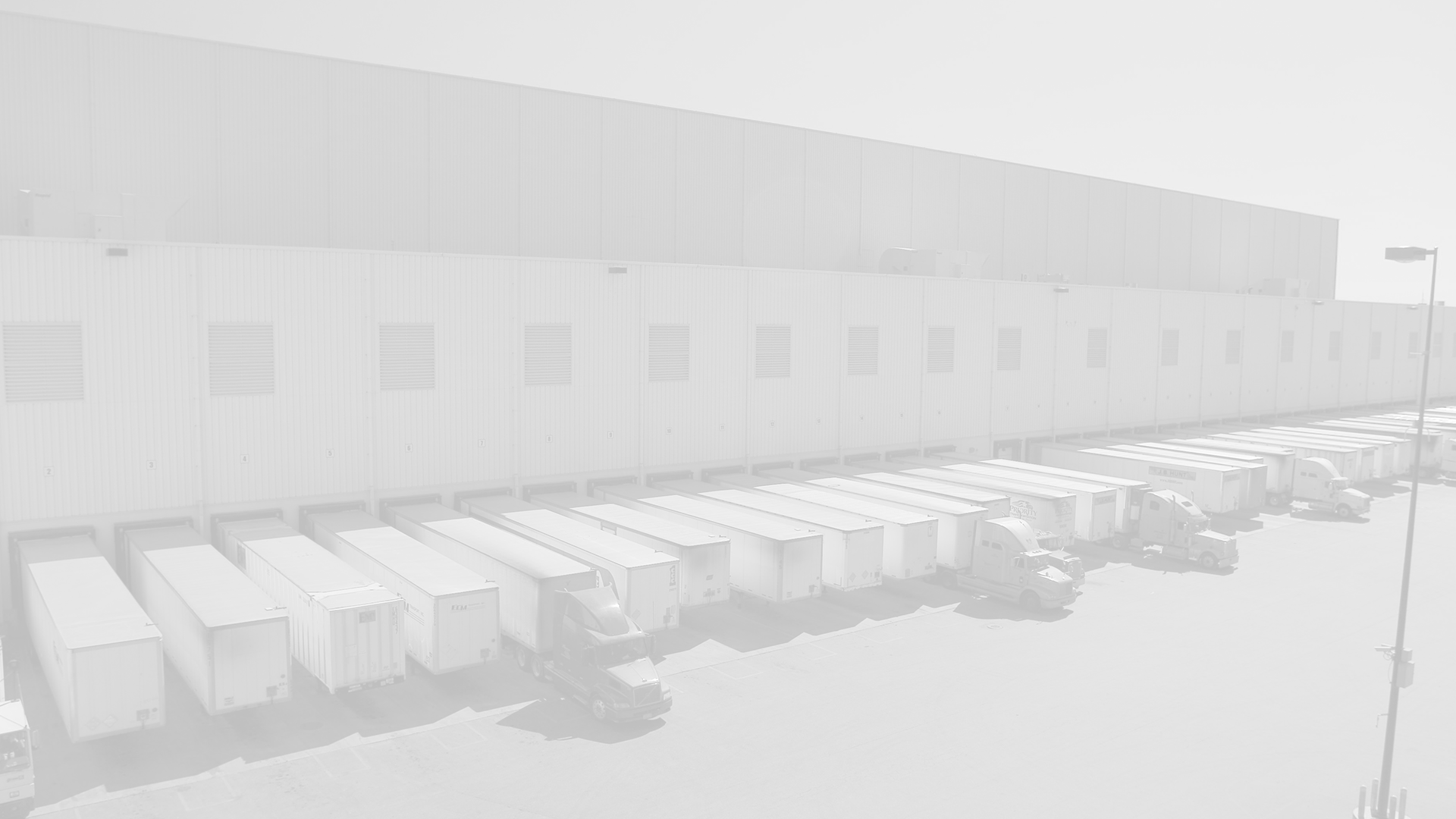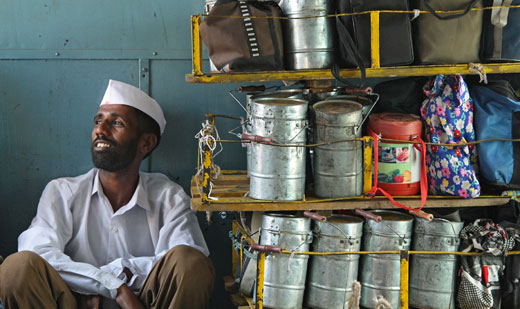As mentioned last week, Starbucks hopes to begin desk delivery in select urban markets as early as next year. Desk delivery in a crowded city environment sounds equally like a new complex innovation and a logistical nightmare. But what if a vastly successful delivery system already existed? What could we learn from it?
On the other side of the globe, in Mumbai, India, a group of dabbawallas have already accomplished what Starbucks is trying to do next year, and have been doing it for over 125 years with great success and little acclaim (except a Harvard Business Review case study and a Six Sigma certification). What is a dabbawalla? Literally translated, the word means “lunch box deliverer”. Every day, thousands of dabbawallas pick up lunches from office workers’ homes and deliver them by foot, bike, train, bus, any means possible to desks all over Mumbai. The system is known for its precision in the face of extreme complexity. A recent Forbes study found only one delay in every 6 million deliveries. That’s 99.999999% accuracy.
As food and grocery business continues to trend toward smaller, more precise delivery and fresher, more natural cooking, the dabbawalla business is still relevant, impressive, and enviable. Supply chain professionals still have much to learn; even Prince Charles shadowed a dabbawalla delivery man for a day.
Read a 2007 NYT article below for more information. A link to an informative video here.
In India, Grandma Cooks, They Deliver
by Saritha Rai, May 29, 2007
MUMBAI, India — Gaurav Bamania, a hedge fund analyst who works in one of the many downtown office towers that now dominate the skyline of India’s financial capital, could easily eat lunch at one of the city’s better restaurants. Instead, Mr. Bamania, 26, follows a practice dating back over a century to the early years of British rule: he has a hot meal, lovingly cooked at home by his grandmother, and delivered to his desk every workday.
In India, where many traditions are being rapidly overturned as a result of globalization, the practice of eating a home-cooked meal for lunch lives on.
To achieve that in this sprawling urban amalgamation of an estimated 25 million people, where long commutes by train and bus are routine, Mumbai residents rely on an intricately organized, labor-intensive operation that puts some automated high-tech systems to shame. It manages to deliver tens of thousands of meals to workplaces all over the city with near-clockwork precision.
At the heart of this unusual network is a chain of delivery men called dabbawallas.
The word comes from tiffin dabba, a colonial reference to a box containing a light meal, and walla, the man who carries. The precision and efficiency of the dabbawallas have been likened to the Internet, where packets identified by unique markers are ferried to their destination by means of a complex network.
“There is a service called FedEx that is similar to ours — but they don’t deliver lunch,” said one dabbawalla, Dhondu Kondaji Chowdhury.
The British introduced the service 125 years ago after the city was flooded by workers from different regions. The dabbawallas made it possible for workers to bridge the distance between work and home and between regional food tastes.
The service has until recently thrived purely on word of mouth. But it is now getting a high-tech lift, as the dabbawallas have joined up with Web service providers. An office worker, with someone lined up at home to cook, can sign up for the service through text messaging or an e-mail message.
Variations of the lunch delivery system have sprung up in the United States, generally in metropolitan areas with large South Asian populations like San Francisco and New York. But these services are comparatively small.
In the urban sprawl of Mumbai (formerly Bombay), where going to work means leaving home as early as 7 a.m., long before the woman of the house has started cooking for the day, the dabbawalla system has withstood the onslaught of office cafeterias, neighborhood eateries, multinational food chains and high-end restaurants, where table reservations are hard to come by. The dabbawallas even deliver in the pouring rain or during political strife. And business is still growing, at a steady rate of 5 percent to 10 percent a year.
The service is at once simple and complex. A network of wallas picks up the boxes from customers’ homes or from people who cook lunches to order, then delivers the meals to a local railway station. The boxes are hand-sorted for delivery to different stations in central Mumbai, and then re-sorted and carried to their destinations. After lunch, the service reverses, and the empty boxes are delivered back home.
The secret of the system is in the colored codes painted on the side of the boxes, which tell the dabbawallas where the food comes from and which railway stations it must pass through on its way to a specific office in a specific building in downtown Mumbai.
“We don’t know how we could survive without this system,” said Vrinda Chiplunkar, who prepares daily lunches of lentils, vegetables, rice, chapatis and salad for her husband, Chandrashekhar Chiplunkar, who runs the foreign exchange division of Oman International Bank. “The old fashioned, inexpensive dabbawalla system is a rare survivor in this fast-paced world.”
The Chiplunkars are loyal customers of 64-year-old Mr. Chowdhury. Like many fellow dabbawallas, Mr. Chowdhury is a migrant from a rural village in the region, still illiterate but having learned on the job to read the numbers and letters painted on the lunch boxes and to sign his name to customer receipts.
“This is the best profession for somebody like me in Mumbai,” Mr. Chowdhury said, pausing from his rounds, which consist of walking up and down winding staircases in old Mumbai apartment blocks, carrying food-laden containers in the morning and returning empty ones later.
With the 5,000 rupees (about $123) he earns every month, he manages to support his wife, son and daughter in a two-room home in the distant Goregaon suburb. Mr. Chowdhury dreams of sending his son, a ninth-grade student, to college. Yet, there is no dearth of dabbawallas as younger men stream into the city from the vicinity of Mr. Chowdhury’s native village.
For Suresh Shivekar, who hauls lunch boxes by train from the Versova suburb to Colaba, the workday starts at 8:30 a.m. as he sprints to collect lunches. He transports the boxes by bicycle and arrives at the train station not long afterward. The boxes are re-sorted there, loaded on to a large wooden crate, which Mr. Shivekar heaves onto the train. On a regular day, the luggage compartment at the front of the train is a sea of lunch boxes, all coded in colored paint.
Mr. Shivekar arrives at Colaba at 11:30 in the morning, where he gets together with a group of other dabbawallas. In a crowded pavement with barely enough space for pedestrians, Mr. Shivekar and his fellow dabbawallas furiously trade boxes, each batch headed for different buildings.
The boxes are then hauled on a wooden cart through the bustling Mumbai traffic, with each lunch personally delivered to its rightful owner. Rarely do Mr. Shivekar, Mr. Chowdhury or any of the dabbawallas know the name of the person or the company they deliver the lunches to. All they know from the code is the building and the floor number.
At 1 p.m., when all the lunches are delivered, Mr. Shivekar and a group of dabbawallas break for their own lunch, settling down in a nearby corner to quickly eat the meals they have carried from their homes.
In the afternoon, the thousands of dabbawallas collect empty lunch boxes and board the trains back. Rarely has Mr. Shivekar missed a delivery or delivered the wrong lunch — on the rare occasion he has, the painted numbers on the boxes had worn off.
And that reliability pays off with loyal customers. Anand Sahasrebuddhe, 46, who works in the Churchgate offices of ACC Limited, one of India’s largest cement and concrete makers, has been depending on the dabbawallas for 26 years.
“He simply loves home-cooked food,” said his mother, Suman Sahasrebuddhe.


